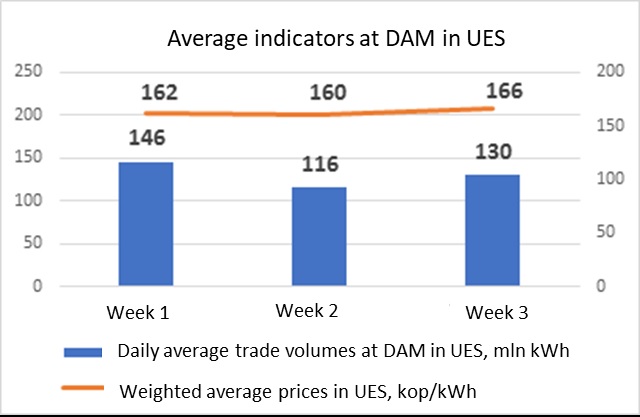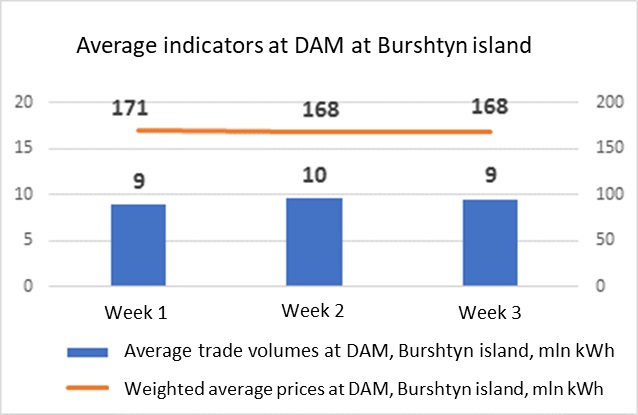Featured Galleries CLICK HERE to View the Video Presentation of the Opening of the "Holodomor Through the Eyes of Ukrainian Artists" Exhibition in Wash, D.C. Nov-Dec 2021
 USUBC COLLECTION OF OVER 160 UKRAINE HISTORIC NEWS PHOTOGRAPHS 1918-1997
USUBC COLLECTION OF OVER 160 UKRAINE HISTORIC NEWS PHOTOGRAPHS 1918-1997
 "HOLODOMOR 1932-33: THROUGH THE EYES OF UKRAINIAN ARTISTS" - COLLECTION OF POSTERS AND PAINTINGS
"HOLODOMOR 1932-33: THROUGH THE EYES OF UKRAINIAN ARTISTS" - COLLECTION OF POSTERS AND PAINTINGS
 USUBC COLLECTION OF HISTORIC PHOTOGRAPHS ABOUT LIFE AND CAREER OF IGOR SIKORSKY PHOTOGRAPHS - INVENTOR OF THE HELICOPTER
USUBC COLLECTION OF HISTORIC PHOTOGRAPHS ABOUT LIFE AND CAREER OF IGOR SIKORSKY PHOTOGRAPHS - INVENTOR OF THE HELICOPTER
 Ten USUBC Historic Full Page Ads in the Kyiv Post
Ten USUBC Historic Full Page Ads in the Kyiv Post

DTEK BRIEF ON KEY BUSINESS ISSUES NO. 11
.jpg) №11/2019
№11/2019
DTEK
Kyiv, Ukraine, Wed, July 24, 2019
Weekly electricity market update (week 3)
There were no failures during the third week of the new electricity market functioning.
The average weighted market price at the DAM in the United Energy System (UES) was 166 kop/kWh during the reported week, which was 6.6 kop/kWh (+4%) higher than during the previous week of market functioning.
The average indicator by volume was 130 mln kWh per day.

Burshtyn Island at the DAM traded at an average of 9.5 mln kWh, the weighted average price dropped by 1 kop/kWh (-1%) compared to the week's indicator of July, 8-14.

Electricity imports continue. NEC Ukrenergo unveiled results for the first 17 days of July. In Burshtyn Island TPP, almost 97 mln kWh of electricity was imported, 92.7 mln kWh of which came from Slovakia and 4.2 mln kWh from Hungary. A total of 6.8 mln kWh was imported from Belarus. Imports support competition and security of energy supply in the market. DTEK continues export and import operations.
The third week of market operations brought a lot of news.
A round table at the Verkhovna Rada Energy and Fuel Committee on the topic "Starting up the wholesale electricity market: first results and challenges" was marked by encouraging feedback, as well as a lively discussion of current problems regarding the need to address debt problems on the electricity market accumulated over the years of the old market, the need for the full launch of the market of auxiliary services, the balancing market, judgments regarding the NEC Ukrenergo tariff, and on further synchronization with ENTSO-E among other matters.
Competition is growing. According to SE “Market Operator”, as of 17.07.2019, 262 participants are registered and more than 200 participants are active (i.e. giving relevant applications on the market at the DAM and at the intraday market). For example, in neighboring Poland, where the market is already liberalized, 200-250 applications are received per day.
RES generators faced nonpayment due to appeal of JSC Nikopol Ferroalloy Plant to the NEURC Resolution #955 on setting transmission and dispatching tariffs for SE NEC “Ukrenergo”. According to the provisions of the Electricity Market Law, the Guaranteed Buyer is responsible for paying the feed-in-tariff for the electricity generated from the alternative sources. Difference between the value of the feed-in-tariff and the market price has to be covered by SE NEC “Ukrenergo”, and was included in the tariff for electricity transmission. The temporary absence of regulation of green electricity payment might lead to significant financial losses for producers.
On July 22nd 2019, NEC Ukrenergo published a "black list" of 62 electricity market participants. Judging by NEC Ukrenergo's comments, the main reason for such a situation is non-observance of the terms and conditions for the provision of financial guarantees. The number of problematic companies is less than 10% from the general number of electricity market participants (774) and their volume of supply is insignificant. There are no risks for electricity market functioning, as consumers of black list companies will receive electricity from the supplier of last resort. In such a way, the market is getting rid of financially unstable participants and protecting reliable market players: as of July 11th 2019, there were 203 black list participants, and then the number decreased to 62.
Ukraine’s power liberalization showcases its European aspiration
“Ukraine’s electricity market liberalization will boost trade with Europe, enhance competition and make the country more energy independent”, stated Maxim Timchenko, CEO of DTEK in today’s issue of Politico, influential European media.
“The launch of the liberalized electricity market is a clear signal to international investors and partners that Ukraine can carry out complex reforms. … If we want to continue in this direction, Ukraine’s energy sector reforms must adhere to the Energy Community’s recommendations. The next step is to substitute cost-plus tariff regulation for electricity distribution using incentive-based tariff regulation. This will encourage investments in the modernization of Ukraine’s worn-out grids, which have now reached 80 percent wear and tear and have about 10 years of operating life remaining.
Updating the energy grid will help Ukraine become more energy-efficient and ensure the infrastructure can support the inclusion of new renewable energy sources, consumers who have more power over how and when they use their energy and electric vehicles.”
First meeting of Energy Community platform for electricity generation companies took place in Vienna
On July 18th 2019, representatives of publicly and privately owned coal-based electricity generation companies from all Energy Community Contracting Parties met in Vienna under the umbrella of the “GENEnC Platform”. Recognizing the role of electricity generation companies in Energy Transition, the platform seeks to address the challenges of the transition in a cost-effective, socially acceptable and acquis-compliant way, enabling the best use of new market opportunities.
DTEK also participated in this event, as the company has already announced that its long-term priorities are decarbonization, decentralization and digitalization. In May this year, DTEK partnered with Eurelectric for a round table on just energy transition “Financing environmentally and socially sustainable energy systems in Europe: challenges and solutions” on the margins of the Power Summit in Florence. In June, DTEK co-organized the third International Coal Conference “Ukrainian coal mining industry in the context of decarbonization” in Dnipro (Ukraine) with high-level participation from the European Commission, UNECE, IFIs, international and local experts and stakeholders.
DTEK participates in the 5th Working Group of the Platform for Coal Regions in Transition
On July 15-16th 2019, the European Commission held the 5th Meeting of the Platform for Coal Regions in Transition in Brussels. The event focused on four aspects: technical assistance opportunities as part of the Initiative, an update on transition strategies, insights from success stories from other EU regions and contributions of other international initiatives to the transition away from coal. The participants also discussed National Energy and Climate Plans and the EU’s Long Term Strategy. Coal mine closure companies and authorities and their role in transition and the potential of renewable energy in coal regions were also discussed.
The Working Group also featured a bottom-up discussion between participants in order to enable direct exchanges of experience at every level. The Secretariat of the Platform for Coal Regions in Transition presented their ongoing work on case-studies and communications tools, access to which will be available for all interested stakeholders including those outside of the EU.
DTEK continues introduction of inventory digitalization solution
On July 15th, DTEK and software developer QRSmarty signed an agreement on cooperation and introduction of this innovative solution.
Laser marking machines will be used to put QR codes on equipment and spare parts. This marking is durable and will not fade during operation or due to natural wear. When a code is scanned, the program will retrieve all information, including the date when the equipment arrived at the company, the supplier’s name, where it was used, and its exact location at a given time.
“Innovation DTEK continues to foster the development of the Ukrainian innovation ecosystem. Half a year ago, QRSmarty won in one of our accelerator programs, and now we have reached the stage where we are introducing their solution into commercial operation. We are happy to implement this technology in the energy sector, and confident that it has considerable potential both within our company and in the industry in general,” said Emanuele Volpe, DTEK Chief Innovation Officer.
DTEK ESCO invested UAH 39 mln in the lighting system
at Ilyich Iron and Steel Works
DTEK ESCO invested UAH 39 mln in the lighting system at Ilyich Iron and Steel Works in Mariupol. Per year, energy savings can reach 12.3 mln kWh, or UAH 19.2 mln, and CO2 emissions can be reduced by 11K tons. “At Ilyich Iron and Steel Works we have already implemented three projects, having invested a total of UAH 73 mln. Together we make our contribution to the energy independence of Ukraine” said Sergey Chulkov, Director of DTEK ESCO.
USUBC NOTE: (entire №11/2019 DTEK BRIEF ON KEY BUSINESS ISSUES found in the PDF document: №11/2019 DTEK BRIEF ON KEY BUSINESS ISSUES)
























